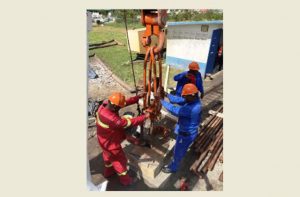THE Guyana Water Incorporated (GWI) has confirmed that it had used Antinfek for the purification of two wells in Diamond Housing Scheme on the East Bank of Demerara and at Hill Foot on the Linden/Soesdyke Highway but ruled out claims that the chemical was also used in Bartica, Region Seven.In fact, the chemical was used in May and June of this year following the purchase of 100 liters from Dove Biotech at a cost of US$17,000. Dove Biotech Limited is based in Thailand.
Antinfek is the brand name for the chemical Polyhexanide which is used as a disinfectant. The consideration of the chemical by GWI has met with major objections from the Director of the Government Analyst Food and Drug Department, Marlan Cole warning against its use, saying that it is harmful.
At a press conference held at its headquarters on Wednesday, GWI Chief Executive Officer, Dr Van West-Charles, with the backing of other senior functionaries of company, in addition to admitting that the chemical was used, argued that the active ingredient found in Antinfek – Polyhexanide (PHMB) – is not as harmful as chlorine which is currently being used.
GWI Director of Operations, Dwayne Shako, during the press conference, disclosed that the chemical was used following the rehabilitation of the Diamond Well Station after it had collapsed for a second time in June.
UNWISE
He said Antinfek was used to disinfect the well which had a significant amount of mud inside, noting too that it would have been unwise to use Chlorine since it is a catalyst for corrosion when used on Carbon Steel – the material used inside the well.
“In order to get that well up as quickly as possible and to be able to distribute that water knowing that it was safe, we used Antinfek to really disinfect the well in Diamond. That allowed us to distribute the water as quickly as possible to residents knowing that it is free from bacteria … and … friendly to our infrastructure,” Shako said.
In explaining the purification process, the Director of Operations noted that the well was dosed with Antinfek and the chemical was allowed to settle before it was pumped out. According to him, the water was tested to ensure that it was wholesome for human consumption.
Similarly, the chemical was used at Hill Foot between May and June. He made it clear that Antinfek was used in the wells month after the company had tested the chemical.
“Testing phase was months or over a year before we visited Diamond,” he posited.
In addressing reporters on the issue which has gained national attention, the CEO said GWI continues to use Chlorine in treatment plants across the country, in areas such as Lima, Bartica, Pouderoyen, Fellowship, Amelia’s Ward, Eccles and even at the Shelter Belt in Georgetown, although there are some concerns about that chemical.
He said chlorine is a disinfectant but it does not kill bacteria such as cryptosporidium. Alluding to a recent visit to Kamarang in Region Seven, Dr West-Charles said water samples taken from the community indicated that the water was contaminated although it was treated with Chlorine.
NOT DANGEROUS AS CHLORINE
Additionally, he said there is the issue of safety, noting that Antinfek is not as “dangerous” as Chlorine. In documents provided to the media by GWI, chlorine was described as a “very controversial chemical which is very good at pathogen removal but reacts with organic materials in water to cause the carcinogenic disinfection by products”.
It is also considered to be a very hazardous, corrosive and poisonous substance at elevated levels. On the flip side, Antinfek was described as a disinfectant which has proven to be a very powerful bactericide.
“It has been proclaimed a safe product for the various application areas mainly human hygiene, public and private health areas, veterinary hygiene, food and feed areas, canned preservatives, film preservatives and drinking water,” a section of a research paper from the British Journal of Environmental Sciences stated.
The document was also issued by GWI in support of its argument.
Adding to the documents provided, Dr West-Charles pointed out that the active ingredient found in Antinfek is products commonly used by Guyanese such as mouth wash, wipes and even chemicals used for cleaning swimming pools.

“We need to ensure that where chlorine cylinders are stored, it has the adequate sensors and the staff is well-trained, and the staff has the necessary protective gears. Antinfek on the other hand, is a registered product by EPA… is a chemical product that is used in things that we are using,” he stated.
Asked whether GWI is considering the continuous usage of Antinfek following the completion of its tests, Dr West-Charles is looking at a “hybrid” approach, explaining that the water company will take in consideration a number of disinfectant products.
“At the end of the day, we have to look at cost and the safety of workers, so those are two of the drivers for the decision-making (process).”
Last Friday, Minister of Communities Ronald Bulkan had confirmed usage of Antinfek by GWI while answering a number of questions in the National Assembly. He had noted, however, that the chemical which is considered safe was used in Guyana before. It was reportedly used in a community in Region 10.











